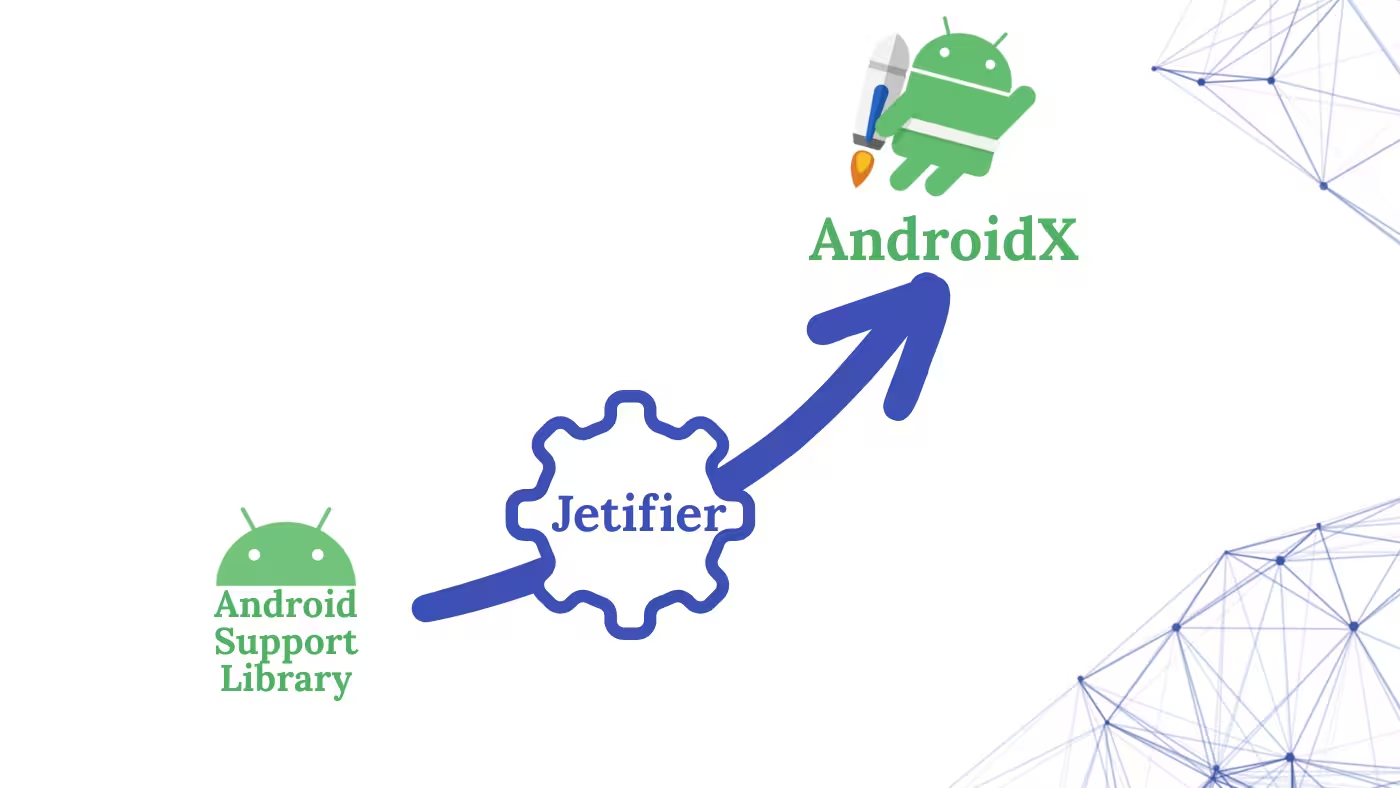- Published on
Jetifier and AndroidX Migration: A Complete Guide
- Authors

- Name
- Daniel Danielecki
- @ddanielecki

Table of Contents
- Introduction
- Understanding AndroidX and Jetifier
- Key Differences Between AndroidX and Android Support Library
- The Migration Process
- Common Migration Scenarios
- Best Practices
- Common Migration Issues and Solutions
- Migration Best Practices
- Troubleshooting Common Errors
- Performance Considerations
- Testing and Validation
- Conclusion
Introduction
AndroidX is the modern replacement for the Android Support Library, providing backward compatibility across Android versions. Jetifier is a tool that helps migrate projects from the older Android Support Library to AndroidX. This comprehensive guide will explain the relationship between these technologies and provide best practices for migration.
Understanding AndroidX and Jetifier
What is AndroidX?
AndroidX is a major improvement to the original Android Support Library. It provides:
- Better Package Management: All AndroidX packages are maintained in a single version set
- Improved Versioning: Clearer version numbers and better compatibility
- Modern Architecture: Better support for modern Android development practices
- Backward Compatibility: Maintains support for older Android versions
What is Jetifier?
Jetifier is a tool that helps migrate third-party libraries from the Android Support Library to AndroidX. It:
- Converts Dependencies: Transforms support library dependencies to their AndroidX equivalents
- Handles Binary Compatibility: Ensures libraries work with AndroidX projects
- Automates Migration: Reduces manual work in the migration process
- Resolves Conflicts: Helps manage dependencies that haven't migrated to AndroidX yet
Key Differences Between AndroidX and Android Support Library
Package Structure Changes
The most noticeable difference is the package naming convention:
// Old Support Library packages
import android.support.v4.app.Fragment
import android.support.v7.app.AppCompatActivity
import android.support.design.widget.FloatingActionButton
// New AndroidX packages
import androidx.fragment.app.Fragment
import androidx.appcompat.app.AppCompatActivity
import com.google.android.material.floatingactionbutton.FloatingActionButton
Key changes in package structure:
android.support.*→androidx.*- Design components moved to
com.google.android.material.* - Core components moved to
androidx.core.*
Version Management
AndroidX introduces a more consistent versioning system:
// Old Support Library (inconsistent versions)
implementation 'com.android.support:appcompat-v7:28.0.0'
implementation 'com.android.support:design:27.1.1'
implementation 'com.android.support:cardview-v7:28.0.0'
// New AndroidX (consistent versions)
implementation 'androidx.appcompat:appcompat:1.6.1'
implementation 'androidx.cardview:cardview:1.6.1'
implementation 'androidx.recyclerview:recyclerview:1.6.1'
implementation 'com.google.android.material:material:1.11.0'
Benefits of AndroidX versioning:
- All libraries use the same version number
- Easier dependency management
- Better compatibility between components
- Simplified updates
Architecture Improvements
AndroidX brings several architectural improvements:
Better Modularization
// Old: Large monolithic libraries implementation 'com.android.support:appcompat-v7:28.0.0' // New: Smaller, focused libraries implementation 'androidx.appcompat:appcompat:1.6.1' implementation 'androidx.core:core-ktx:1.12.0' implementation 'androidx.lifecycle:lifecycle-viewmodel-ktx:2.7.0'Kotlin Support
// Old: Java-focused APIs import android.support.v4.content.ContextCompat val color = ContextCompat.getColor(context, R.color.my_color) // New: Kotlin-friendly extensions import androidx.core.content.ContextCompat val color = context.getColor(R.color.my_color)Backward Compatibility
Both libraries maintain backward compatibility, but AndroidX does it better with:
- More consistent API design
- Better performance
- Smaller binary size
Migration Impact
Understanding these differences helps in planning the migration:
Code Changes Required
- Update import statements
- Replace deprecated APIs
- Update resource references
- Modify build configurations
Build System Updates
// Old build.gradle android { compileSdkVersion 28 defaultConfig { targetSdkVersion 28 } } // New build.gradle android { compileSdkVersion 33 defaultConfig { targetSdkVersion 33 } }Third-Party Library Compatibility
// Old libraries might need updates implementation 'com.example:old-library:1.0.0' // Uses android.support.* // New libraries should use AndroidX implementation 'com.example:new-library:2.0.0' // Uses androidx.*
The Migration Process
Enabling AndroidX
To enable AndroidX in your project, add these properties to your gradle.properties file:
android.useAndroidX=true
android.enableJetifier=true
Understanding the Flags
android.useAndroidX=true- Enables AndroidX in your project
- Required for new projects
- Makes AndroidX dependencies available
android.enableJetifier=true- Enables automatic conversion of third-party libraries
- Only needed if you use libraries that haven't migrated to AndroidX
- Can be disabled once all dependencies are migrated
Common Migration Scenarios
New Projects
For new projects, it's recommended to:
- Start with AndroidX from the beginning
- Use AndroidX dependencies exclusively
- Avoid mixing Support Library and AndroidX
dependencies {
implementation 'androidx.appcompat:appcompat:1.6.1'
implementation 'androidx.core:core-ktx:1.12.0'
// Other AndroidX dependencies
}
Existing Projects
For existing projects, the migration process involves:
- Enabling AndroidX
- Updating dependencies
- Refactoring code
- Testing thoroughly
Best Practices
Dependency Management
Use Latest Versions
// Good: Using latest stable versions implementation 'androidx.appcompat:appcompat:1.6.1' // Avoid: Using outdated versions implementation 'androidx.appcompat:appcompat:1.0.0'Consistent Versioning
// Good: Using the same version for related libraries implementation 'androidx.core:core:1.12.0' implementation 'androidx.core:core-ktx:1.12.0' // Avoid: Mixing versions implementation 'androidx.core:core:1.12.0' implementation 'androidx.core:core-ktx:1.11.0'
Code Migration
Update Import Statements
// Old Support Library imports import android.support.v7.app.AppCompatActivity import android.support.v4.content.ContextCompat // New AndroidX imports import androidx.appcompat.app.AppCompatActivity import androidx.core.content.ContextCompatUpdate Class References
// Old Support Library val fragment = android.support.v4.app.Fragment() // New AndroidX val fragment = androidx.fragment.app.Fragment()
Common Migration Issues and Solutions
Library Compatibility Issues
One of the most common challenges developers face is using libraries that haven't migrated to AndroidX. Here's how to handle these situations:
// Problem: Using a library that depends on the old Support Library
implementation 'com.example:old-library:1.0.0' // Uses android.support.*
// Solution 1: Enable Jetifier to automatically convert the library
android.enableJetifier=true
// Solution 2: Find an AndroidX version of the library
implementation 'com.example:new-library:2.0.0' // Uses androidx.*
Gradle Sync Errors
If you encounter Gradle sync errors after enabling AndroidX, try these solutions:
// In gradle.properties
android.useAndroidX=true
android.enableJetifier=true
// In build.gradle (app level)
android {
compileSdkVersion 33 // Use a recent SDK version
defaultConfig {
// ... other config ...
vectorDrawables.useSupportLibrary = true
}
compileOptions {
sourceCompatibility JavaVersion.VERSION_1_8
targetCompatibility JavaVersion.VERSION_1_8
}
}
Handling Mixed Dependencies
When you have both AndroidX and Support Library dependencies:
// Problem: Mixed dependencies causing conflicts
implementation 'androidx.appcompat:appcompat:1.6.1'
implementation 'com.android.support:appcompat-v7:28.0.0' // Conflict!
// Solution: Use exclude to remove conflicting dependencies
implementation('com.example:some-library:1.0.0') {
exclude group: 'com.android.support'
exclude module: 'appcompat-v7'
}
Migration Best Practices
Step-by-Step Migration Process
Backup Your Project
# Create a backup branch git checkout -b backup-before-androidx git add . git commit -m "Backup before AndroidX migration"Update Gradle Properties
# gradle.properties android.useAndroidX=true android.enableJetifier=trueUpdate Dependencies
// build.gradle (app level) dependencies { // Remove old support libraries // implementation 'com.android.support:appcompat-v7:28.0.0' // Add AndroidX equivalents implementation 'androidx.appcompat:appcompat:1.6.1' implementation 'androidx.core:core-ktx:1.12.0' implementation 'androidx.cardview:cardview:1.6.1' implementation 'androidx.lifecycle:lifecycle-runtime:2.7.0' implementation 'androidx.lifecycle:lifecycle-viewmodel:2.7.0' implementation 'androidx.lifecycle:lifecycle-livedata:2.7.0' implementation 'com.google.android.material:material:1.11.0' }Refactor Code
// Old imports import android.support.v7.app.AppCompatActivity import android.support.v4.content.ContextCompat // New imports import androidx.appcompat.app.AppCompatActivity import androidx.core.content.ContextCompat
Handling Third-Party Libraries
For libraries that haven't migrated to AndroidX:
Check for Updates
- Look for newer versions that support AndroidX
- Check the library's GitHub issues for migration status
- Consider alternative libraries that support AndroidX
Use Jetifier
// Keep Jetifier enabled until all libraries are migrated android.enableJetifier=trueTemporary Solutions
// If a library is critical and has no AndroidX version implementation('com.example:old-library:1.0.0') { exclude group: 'com.android.support' }
Troubleshooting Common Errors
This project uses AndroidX dependencies Error
If you see this error, it means you're mixing AndroidX and Support Library dependencies:
// Solution: Ensure all dependencies use AndroidX
dependencies {
// Remove any com.android.support dependencies
// implementation 'com.android.support:appcompat-v7:28.0.0'
// Use only androidx.* dependencies
implementation 'androidx.appcompat:appcompat:1.6.1'
}
Cannot resolve symbol Errors
If you see unresolved symbol errors after migration:
Clean and Rebuild
./gradlew clean ./gradlew buildInvalidate Caches
- In Android Studio: File → Invalidate Caches / Restart
Check Import Statements
// Wrong import android.support.v7.app.AppCompatActivity // Correct import androidx.appcompat.app.AppCompatActivity
Performance Considerations
Build Time
- Jetifier adds some overhead to the build process
- Consider disabling it once migration is complete
- Use the latest version of the Android Gradle Plugin
App Size
- AndroidX libraries are optimized for size
- Use R8/ProGuard for further optimization
- Remove unused dependencies
Testing and Validation
Migration Testing
Unit Tests
- Update test dependencies to AndroidX
- Verify all tests pass after migration
- Add new tests for AndroidX-specific features
Integration Tests
- Test all features that use migrated components
- Verify backward compatibility
- Check for any UI inconsistencies
Validation Checklist
- All dependencies updated to AndroidX
- No Support Library imports remaining
- All tests passing
- UI consistent across devices
- Performance metrics within acceptable range
Conclusion
Migrating to AndroidX is a crucial step in modern Android development. While the process can be challenging, the benefits of using AndroidX include:
- Better package management
- Improved versioning
- Modern architecture support
- Long-term maintainability
Jetifier makes this migration process smoother by handling the conversion of third-party libraries, but it's important to:
- Plan the migration carefully
- Test thoroughly
- Keep dependencies up to date
- Follow best practices